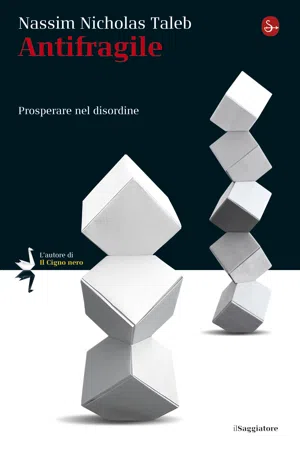About Edmond, La Grèce contemporaine, Hachette, Paris 1855.
Abrahamson Eric e Freedman David H., La forza del disordine. I benefici nascosti del caos: dall’economia globale alla vita quotidiana, trad. it. di I. Annoni, M. Carozzi e A. Zucchetti, Rizzoli, Milano 2007.
Abramson J. e Wright J., «Are Lipid-Lowering Guidelines Evidence-Based?», in The Lancet, 2007, vol. 369, n. 9557, pp. 168-169.
Accord Study Group, «Action to Control Cardiovascular Risk in Diabetes (Accord) Trial: Design and Methods», in American Journal of Cardiology, 2007, n. 99 (suppl.), pp. 21i-33i.
Acemoglu Daron e Robinson James A., Perché le nazioni falliscono. Alle origini di prosperità, potenza e povertà, trad. it. di M. Allegra e M. Vegetti, il Saggiatore, Milano 2013.
Akanji A.O., Mojiminiyi O.A. e Abdella N., «Beneficial Changes in Serum Apo A-1 and Its Ratio to Apo B and HDL in Stable Hyperlipidaemic Subjects After Ramadan Fasting in Kuwait», in European Journal of Clinical Nutrition, 2000, vol. 54, n. 6, pp. 508-513.
Allendy René, Paracelso, il medico maledetto, F.lli Bocca, Milano 1942.
Alter A.L., Oppenheimer D.M. et al., «Overcoming Intuition: Metacognitive Difficulty Activates Analytic Reasoning», in Journal of Experimental Psychology: General, 2007, vol. 136, n. 4, p. 569.
Anderson G., Foreyt J., Sigman-Grant M. e Allison D., «The Use of Low-Calorie Sweeteners by Adults: Impact on Weight Management», in Journal of Nutrition, 2012, vol. 142, n. 6, pp. 1163s-1169s.
Anderson P.W., «More is Different», in Science, New Series, 4 agosto 1972, vol. 177, n. 4047, pp. 393-396.
Anderson R.C. e Reeb D.M., «Board Composition: Balancing Family Influence in S&P 500 Firms, in Administrative Science Quarterly, 2004, pp. 209-237.
Andreoli A., Monteleone M., Van Loan M., Promenzio L., Tarantino U. e De Lorenzo A., «Effects of Different Sports on Bone Density and Muscle Mass in Highly Trained Athletes», in Medicine & Science in Sports & Exercise, 2001, vol. 33, n. 4, pp. 507-511.
Anson R.M., Guo Z. et al., «Intermittent Fasting Dissociates Beneficial Effects of Dietary Restriction on Glucose Metabolism and Neuronal Resistance to Injury from Calorie Intake», in Proceedings of the National Academy of Sciences of the United States of America, 2003, vol. 100, n. 10, p. 6216.
Arbesman S., «The Life-Spans of Empires», in Historical Methods: A Journal of Quantitative and Interdisciplinary History, 2011, vol. 44, n. 3, pp. 127-129.
Arikha Noga, Gli umori. Sangue, flemma bile, trad. it. di G. Bernardi, Bompiani, Milano 2009.
—, «Just Life in a Nutshell: Humours as Common Sense», in Philosophical Forum Quarterly, 2008, vol. 39, n. 3.
Arnheim Rudolf, Entropia e arte: saggio sul disordine e l’ordine, trad. it. di R. Pedio, Einaudi, Torino 1981.
Arnqvist G. e Kirkpatrick M., «The Evolution of Infidelity in Socially Monogamous Passerines: The Strength of Direct and Indirect Selection on Extrapair Copulation Behavior in Females», in American Naturalist, 2005, vol. 165, n. 5.
Aron Raymond, Dimensions de la conscience historique, Editions Plon, Paris 1964.
Arrow Kenneth, «Aspects of the Theory of Risk-Bearing», Yrjö Jahnsson Lecture 1965, ristampa in Essays in the Theory of Risk Bearing, Arrow Kenneth (ed.), Markham Publishing Company, Chicago 1971.
Atamas S.P. e Bell J., «Degeneracy-Driven Self-Structuring Dynamics in Selective Repertoires», in Bulletin of Mathematical Biology, 2009, vol. 71, n. 6, pp. 1349-1365.
Athavale Y., Hosseinizadeh P. et al., «Identifying the Potential for Failure of Businesses in the Technology, Pharmaceutical e Banking Sectors Using Kernel-Based Machine Learning Methods», Ieee 2009.
Aubet María Eugenia, The Phoenicians and the West: Politics, Colonies and Trade, Cambridge University Press, Cambridge 2001.
Audard Catherine (ed.), Le respect: De l’estime à la déférence: une question de limite, Editions Autrement, Paris 1993.
Aurengo André, «Dose-Effect Relationships and Estimation of the Carcinogenic Effects of Low Doses of Ionizing Radiation», Académie des Sciences et Académie Nationale de Médecine, 2005.
Ayanian J.Z. e Berwick D.M., «Do Physicians Have a Bias Toward Action?», in Medical Decision Making, 1991, vol. 11, n. 3, pp. 154-158.
Ayres Ian, Super Crunchers, trad. it. di G.L. Giacone, Sperling & Kupfer, Milano 2008.
Bakwin H., «Pseudodoxia Pediatrica», in New England Journal of Medicine, 1945, vol. 232, n. 24, p. 692.
Ball Philip, The Devil’s Doctor: Paracelsus and the World of Renaissance Magic and Science, Farrar, Straus & Giroux, New York 2006.
—, Universe of Stone: A Biography of Chartres Cathedral, HarperCollins, New York 2008.
Bar-Yam Y. e Epstein I., «Response of Complex Networks to Stimuli», in Proceedings of the National Academy of Sciences of the United States of America, 2004, vol. 101, n. 13, p. 4341.
—, Introducing Complex Systems, New England Complex Systems Institute 57, Cambridge 2001.
Barkan I., «Imprisonment as a Penalty in Ancient Athens», in Classical Philology, 1936, vol. 31, n. 4, pp. 338-341.
Barry D.W. e Kohrt W.M., «BMD Decreases over the Course of a Year in Competitive Male Cyclists», in Journal of Bone and Mineral Research, 2008, vol. 23, n. 4, pp. 484-491.
Barty-King Hugh, The Worst Poverty: A History of Debt and Debtors, Budding Books, London 1997.
Basalla George, L’evoluzione della tecnologia, trad. it. di A. Serafini, Rizzoli, Milano 1991.
Bates Don (ed.), Knowledge and th...
